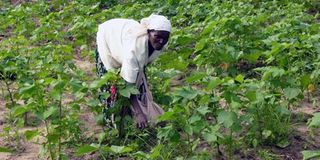Cotton farmers ask President to lift ban on GM crops

A farmer tending her cotton crop. Expected soon after will be the release of Bt maize and Bt cotton, following application to the National Biosafety Authority by the Kenya Agricultural and Livestock Research Organisation and the African Agricultural Technology Foundation. FILE PHOTO | NATION MEDIA GROUP
What you need to know:
- Annual cotton production in Kenya has fallen to less than 20,000 bales from more than 70,000 in 1985.
- Embu Deputy Governor Dorothy Nditi said cotton was a major contributor to food security since it thrived in relatively dry areas.
- The deputy governor admitted that seeds supplied to farmers by the county government were of low quality.
- Mr Paul Chege, a researcher, said Bt cotton naturally produces chemicals harmful to certain pests, especially the larvae of bollworms.
Cotton farmers from eight counties have petitioned President Kenyatta to lift the ban on genetically modified crops.
They said this would help them access high-yielding Bt cotton variety.
Annual cotton production in Kenya has fallen to less than 20,000 bales from more than 70,000 in 1985.
Speaking during a forum on agricultural biotechnology at Embu University, farmers from Embu, Kirinyaga, Kitui, Machakos, Makueni, Meru, Murang’a and Tharaka-Nithi said a fall in production had reduced their income.
Embu Deputy Governor Dorothy Nditi said cotton was a major contributor to food security since it thrived in relatively dry areas.
“Production used to be high in the 1980s when the population was small. With the increase in population and advancement in technology, production has gone down,” she said.
She added that as the country geared towards the realisation of Vision 2030 and middle income status, stakeholders in the cotton sector needed to reassert their position in society.
The deputy governor admitted that seeds supplied to farmers by the county government were of low quality.
COTTON POLICY
Ms Nditi said the county was developing a cotton policy which would borrow heavily from the 2006 Cotton Amendment Bill.
“The Bill saw national production rise from 5,090 tonnes in 2005 to 9,800 tonnes in 2006.
"The county government is revising these national pieces of legislation to align them with the needs of our people,” she said.
Mr Paul Chege, a researcher, said Bt cotton naturally produces chemicals harmful to certain pests, especially the larvae of bollworms.
Mwea Ginnery Director Mugo Makanga said the processor was making losses because cotton supplied by farmers was insufficient.
Horticulture Research Institute director and principal researcher of Bt cotton, Dr Charles Waturu said farmers growing the variety would use less chemicals to control the pests.
He said an acre produces up to 1,200 kilogrammes of Bt cotton.
“About 25 million acres are under the variety worldwide,” he added.
Dr Waturu said Burkina Faso and Sudan had already put 500,000 acres and 90,000 acres under the variety respectively while Kenya could potentially produce about 200,000 bales.





